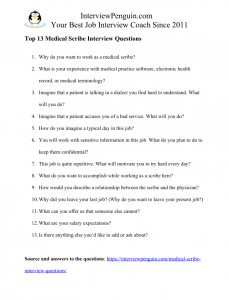Effective and pleasant patient care isn’t the result of the work of only one professional, the physician. Other people also play their role, and it is an important one. Receptionists, assistants, and of course scribes, who work in a close contact with the physician, also contribute to a good experience (or sometimes to a bad one) of each patient.
You can learn a lot in this job, and it is a perfect position to have if you aspire to study at med school later, or perhaps at a PA school. But it is not easy to get the job, because candidates do not need any special qualification to apply (high school diploma will do), and hence many of them apply for the job, and you will need to say something to stand out.
Let’s have a look at the questions you may face in an interview, and what you should say while trying to stand out and make a memorable impression.
Table of Contents
Why do you want to work as a medical scribe?
The very best answer is the one that makes sense in the context of your professional career and life. For example, you dream of becoming a physician one day. Maybe you plan to submit your application to several med schools during the next application cycle.
To gain some advantage, and to get a better understanding of your future job, you’d love to work as a scribe, having a close cooperation with the physician, and an ability to ask them questions and to learn more about your future profession. Such an answer makes a perfect sense, and explains why you apply for the job.
Another example: You’ve been working as an administrative assistant for several years, and your typewriting skills really stand out. But you got a bit tired of the routine of your job, and struggle to see a meaningful purpose in the job anymore.
You’d love to work in healthcare, helping people with your work, and with your experience and skills, the job of a scribe is the best match, or perhaps the only position you can realistically get in the field of healthcare. Hence you decided to give it a shot and sent your application.
Anything you say, they should get an impression that you know why you apply for a job of a scribe, that it is your first choice, and not your last option.
What is your experience with medical practice software, electronic health record, or medical terminology?
You can find yourself in two positions at this point of an interview. The first one–and the one that is more likely, is that you have no experience with any of those things. That’s logical, since you have never worked in a medical practice before…
If that’s the case, you should say the truth, but also elaborate on your answer. Say that while you have never worked with a medical practice software, you have experience with other software programs (such as MS Office, for example), and great computer skills, and certainly you will learn how to work with their software in no time.
The same applies to EHR and medical terminology. You do not have much (or any) experience with them, but since you have passion for work, and a desire to become a great scribe, you will certainly learn it in no time, as long as the communication between you and the physician works as it should.
If you have experience (the less likely case), just say what software (brand, name) you worked with before, and for how long.
Imagine that a patient is talking in a dialect you find hard to understand. What will you do?
You should show the right attitude, and it is this one: You will politely ask them to speak slowly, or to articulate better, because you want to make an accurate record in the system, because that’s the most important thing in healthcare as far as we talk about a job of a scribe.
Ensure your interviewers that you are patient with people with dialects, and also a great listener. You won’t shout on them or anything else. Politely asking them to speak slowly or to repeat the part you did not understand, you will eventually make an accurate record, and deliver a good service at the same time.
Imagine that a patient accuses you of a bad service. What will you do?
This question is an opportunity to show your empathy with the patients, your emotional intelligence, and also your desire to deliver an outstanding service to each and every patient.
Say that you will listen to their words carefully, because the feedback you get from the patients is superbly important to you. In no way will you argue with them. On the contrary, you will try yo understand what went wrong, and whether you made a mistake, because regardless of how hard you try, you are just a human being, and you can make a mistake.
If you identify that you made a mistake, you will apologize. And if the problem is that they misunderstood something, you explain it another time, in a calm voice. It may also happen that they complain simply because their condition is miserable. You have an understanding for their feelings (it’s not easy to be sick, and bear all the implications it has on our life), and hence you won’t take their words personally.
You’ll try your best, and you will eventually move on to the next patient, without dwelling on the negative experience you had with one of the patients.
How do you imagine a typical day in this job?
The most important thing is to show realistic expectations, to not hope for something the job cannot provide to you. Scribes aren’t allowed to administer injections or perform any other clinical duties. You will write most of the time, typically entering records to electronic health register, but you may also respond for billing and for printing invoices, and for the initial communication with the patient.
What exactly you will do depends on many factors–the preferences of the physician, the organization of their practice, whether they employ any other assistants, etc. But as long as you say that you imagine taking care of administrative duties, following the directions of your superior, and trying to help whenever you can, they will be satisfied with your answer.
You will work with sensitive information in this job. What do you plan to do to keep them confidential?
First and foremost, ensure the interviewers that integrity belongs to your core values. You know that the information in confidential, and hence what happens in the practice stays in the practice. You do not plan to share the information about patients with anyone, including your family members. And it doesn’t matter how shocking or interesting it may be. You will simply not share them.
Then you can talk about some practical measures, such as keeping the files of the patients in locked drawers (if the physician still works with paper forms), or protecting the entry to the electronic register with a strong password, and basically doing whatever you can to ensure that the information remains confidential, and a third party cannot access the files.
This job is quite repetitive. What will motivate you to try hard every day?
Here you have several options for a really good answer. One is saying that in your view, the job isn’t repetitive. Surely, you will sit at a computer and write all day long. But each patient is different, each has their own story, problems, emotions, and since you have passion for healthcare, and perhaps also try to learn something about various diagnosis and treatments and people (if you plan to enroll in a medical school later), you find it extremely interesting.
Another option is saying that you prefer routine and repetitive jobs. Instead of variability you seek routine, but that doesn’t mean that you will get satisfied with your work easily, or end up bored quickly. On the contrary, you enjoy the process of trying to improve in everything you do. Maybe you can make an entry in a shorter time, talk to this or that patient in a more appropriate way, and you will continue trying to perfect the way in which you do your job…
Other questions you may face in your medical scribe interview
- What do you want to accomplish while working as a scribe here?
- How would you describe a relationship between the scribe and the physician?
- Why did you leave your last job? (Why do you want to leave your present job?)
- What can you offer us that someone else cannot?
- What are your salary expectations?
- Is there anything else you’d like to add or ask about?
* Special Tip: You can also download the full list of questions in a one page long PDF, print it, and practice your interview answers anytime later:

Conclusion, next steps
Interview for a job of a medical scribe belongs to interviews with average difficulty. You won’t face any super tough questions, but you will typically compete with many other applicants, which makes your situation more difficult.
At the end of the day, personal preferences of a physician play an important role in this interview. Try to make a good connection with them, try to be a pleasant companion. You two will spend a lot of time together in the job. Unless they enjoy the time they spend in the interview with you, they won’t hire you…
May also interest you:
- Medical Assistant interview questions.
- Medical Receptionist interview questions.
- Healthcare interview – What are your strengths and weaknesses?


